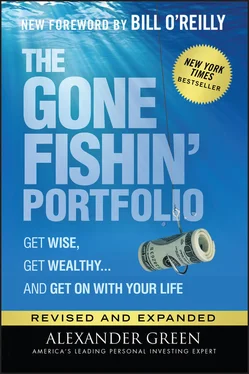4 You have a coherent plan that gives you a high probability of achieving your most important financial goals.
5 And you are committed to following through to achieve those goals.
Let's start with understanding how most wealthy Americans got that way.
According to The New York Times , there were 18.6 million millionaires in the United States in 2019.
Spectrem Group reports that there were also more mass affluent households with a net worth between $100,000 and $1 million, excluding primary residences: 31.8 million, or nearly 1 in 4 households.
Yet a Federal Reserve survey that same year found that nearly 80% of Americans live paycheck to paycheck. Half say they would have trouble finding $400 to pay for an emergency.
This is a dramatic disparity, and it has hardly gone unnoticed. People tend to measure their well-being not according to their own material comfort against, say, their parents’, but against their peers.
As a result, economic inequality has become an obsession in recent years. President Barack Obama called it “the defining challenge of our time.” Pope Francis called it “the root of social evil.”
Conventional wisdom holds that the richest Americans are hoarding the nation's wealth while everyone else stagnates or loses ground. This isn't just untrue. It's laughably wrong. Yet most people don't understand why.
Average U.S. household income and net worth hit all-time records in 2019. Things took a dip during the pandemic, but there have never been more households making over $100,000 a year. There has never been a smaller percentage of households earning less than $35,000 in inflation-adjusted terms. It's objectively untrue that the rich are getting richer and the poor are getting poorer. Every quintile has been moving up, not just over the last few years, but for decades.
Yes, the affluent have been getting richer faster than everyone else. But that's not terribly surprising in a knowledge-based economy, where education and specialized skills are in high demand.
However, economic inequality in itself is not morally objectionable. What is objectionable is poverty . Our goal should not be that everyone has the same. It should be that everyone has enough .
This confusion of poverty and inequality is due to what psychologists call the “zero-sum fallacy.” This is the mistaken notion that wealth is a finite resource—like a pizza—that is divvied up in zero-sum fashion. So if Oprah Winfrey has more money, I necessarily have less.
That's not how the economy works. Wealth isn't just distributed. First it has to be created. Total wealth increases—and occasionally decreases—over time. The size of the economy, the amount of household income and total household net worth rise as the years go by.
If you're a worker who would like to increase your pay, it's important to know that earned income is generally decided by nine factors:
1 Your educational attainment
2 Your chosen profession and specialization
3 Your years of experience
4 Your hours worked
5 Your work ethic
6 Your social skills
7 Your competence and proficiency in your job
8 Your ability to cooperate with, inspire and lead your co-workers
9 Your ambition to rise in the organization.
If you want to earn more, the choice is clear: Make yourself indispensable to someone.
Yes, some people are born with greater genetic gifts than others. You and I, unfortunately, were not born with the looks of Brad Pitt, the athleticism of LeBron James or the intellect of Isaac Newton.
Some of us are dealt better hands than others. Some are born with higher IQs or into high-income households (with all the advantages they confer) or to more nurturing parents. But we each need to play the hand we're dealt to the best of our ability.
From an economic standpoint, that means maximizing your education and marketable skills; showing competence, reliability and integrity at work; and doing whatever you can to rise in the organization. (Or seek out better alternatives elsewhere.)
Complaining that “capitalism is broken,” “the system is rigged” and “life isn't fair” will not increase your income or net worth one penny. It is, however, guaranteed to make you bitter and unhappy.
Beyond income inequality, there is another form of economic disparity in this country. Some households have a much higher net worth than others. There is a significant wealth gap.
Is this unfair? Not necessarily. In my many decades as a money manager, investment analyst and financial writer, I've learned that wealth accumulation is based on six primary factors:
1 Your ability to maximize your income
2 Your propensity to save
3 Your appetite for risk
4 Your willingness and ability to let your money compound
5 The investment costs you absorb
6 The taxes you pay.
These factors are under your control. (Even the last one to a great extent, as I'll discuss in Chapter 13.)
Investment success is mainly about knowledge and personal accountability. It is only when we accept full responsibility for our choices and our actions that we take the giant step from childhood to adulthood.
Yet many choose to embrace the psychology of helplessness and victimhood, preferring to explain all their struggles in terms of the actions of others.
We often meet middle-aged men and women who are still grumbling about earlier unhappy experiences, who are still blaming their problems on other people or “the breaks.” They are angry with their parents, fuming at an old boss, still simmering over their ex-spouse. They are upset about the injustice of it.
And you know what? They're right. Life isn't fair. There is no perfect justice. But fear, self-pity, envy, jealousy and anger hold us back, tie us down and suck the joy out of life.
Management consultant Brian Tracy points out that there is a simple antidote to the factors that create these negative emotions. You need only say three words: I am responsible.
Whether your problem is joblessness, addiction, overspending, obesity or poor finances, you move closer to a solution the moment you say “I am responsible.”
It is impossible to say these words and still feel angry. The very act of taking responsibility short-circuits and cancels out negative emotions.
Yet many would rather train for the Boston Marathon in 3 feet of snow than utter these words. Why? Psychologists say human beings have a natural propensity to accumulate pride and shun regret. In other words, we tend to take responsibility for the positive developments in our lives and attribute unfavorable developments to others or circumstances.
This is not to say there aren't times when our lives are significantly influenced by outside forces. Maybe you are a great worker who lost your job due to corporate downsizing. Maybe your parents really were poor role models. But it is only when you choose to focus on what you can do and how you should act that you gain power.
Today, businesses and other organizations are looking for people who are willing and able to think, who are self-directing and self-managing, who respond to problems proactively rather than merely waiting for someone else's solutions.
A study done in New York a few years ago found that people who ranked in the top 3% in every field had a special attitude that set them apart from average performers in their industries. What was it? They chose to view themselves as self-employed throughout their careers, no matter who signed their paychecks.
These are people who set goals, make plans, measure progress and get results. Personal responsibility changes everything. It means you own your thoughts, impulses, feelings and actions. You are accountable for the consequences they bring and the impact they have on others.
Читать дальше












